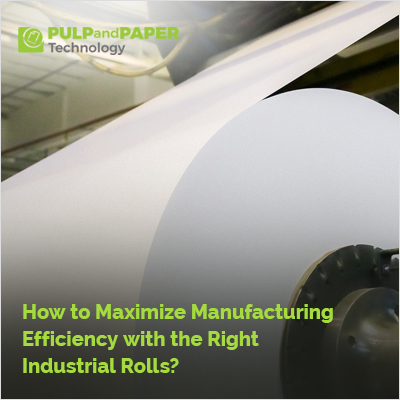How to Maximize Manufacturing Efficiency with the Right Industrial Rolls?

Maximizing manufacturing efficiency with the right industrial rolls involves selecting and maintaining the appropriate rolls for specific processes. Industrial rolls play a crucial role in various manufacturing applications, such as converting, printing, packaging, and more. Here are some key steps to ensure you maximize efficiency:
Understand Your Process Requirements:
Understanding your process requirements is a pivotal first step in maximizing manufacturing efficiency through the appropriate selection of industrial rolls. A comprehensive analysis of the manufacturing process is essential, delving into the intricacies of each stage. Critical factors such as speed, tension, temperature, and pressure must be carefully considered to determine the precise specifications required for industrial rolls. The speed of the process dictates the dynamic performance of the rolls, while tension levels impact the material handling and overall stability. Temperature considerations are crucial, especially in industries with extreme conditions, as they influence the choice of materials for the rolls. Additionally, the pressure exerted during different stages necessitates rolls with specific durability and load-bearing capabilities. By thoroughly examining these factors, manufacturers can tailor their industrial roll selection to align seamlessly with the unique demands of their production processes, ultimately optimizing efficiency and performance.
| Also Read: Rolls and Tapes: Enhancing Efficiency and Quality in the Pulp and Paper Industry |
Choose the Right Material:
Choosing the right material for industrial rolls is a critical decision that directly influences the effectiveness and longevity of manufacturing processes. Selecting materials aligned with the demands of the specific application is paramount. Common options encompass steel, known for its robustness and load-bearing capacity, rubber for its elasticity and shock absorption, polyurethane for its resilience and abrasion resistance, and composite materials offering a blend of desirable properties. The decision-making process should extend beyond mere material availability to a thorough consideration of factors such as durability, chemical resistance, and thermal stability. Assessing the expected wear and tear, exposure to chemicals, and temperature variations in the manufacturing environment aids in determining the most suitable material. By meticulously matching material attributes with application requirements, manufacturers ensure the longevity and optimal performance of their industrial rolls in diverse industrial settings.
Optimize Roll Design:
Optimizing the design of industrial rolls is a crucial aspect of enhancing manufacturing efficiency, and collaboration with experienced roll manufacturers plays a pivotal role in achieving this goal. Working closely with these specialists allows for the creation of rolls that are precisely tailored to meet the specific requirements of the manufacturing process. Consideration of key design factors such as diameter, length, surface finish, and core design is essential in the quest to optimize performance. The diameter of the roll influences the material's handling characteristics, while the length is a crucial factor in determining the overall stability and functionality of the roll. Surface finish impacts friction and wear, influencing the smooth operation of the manufacturing process. Additionally, core design plays a role in the overall structural integrity and balance of the rolls. By giving meticulous attention to these design elements, manufacturers can ensure that their industrial rolls are customized to maximize efficiency, minimize downtime, and ultimately contribute to the overall success of their manufacturing operations.
| Also Read: How Rolls, Tapes, and More Innovate the Pulp And Paper Industry? |
Precision and Balance:
Precision and balance play pivotal roles in the manufacturing of industrial rolls, exerting direct influence on operational efficiency and longevity. It is imperative to uphold a high degree of precision during roll manufacturing, ensuring accurate dimensions and consistent performance. Additionally, maintaining optimal balance is crucial to minimize vibrations and enhance overall operational stability. Unbalanced rolls pose a significant risk by increasing wear and tear on machinery, resulting in decreased operational efficiency. The repercussions of vibrations extend beyond the rolls themselves, potentially causing disruptions throughout the entire manufacturing system and jeopardizing product quality. Therefore, emphasizing precision in manufacturing and ensuring meticulous balance of industrial rolls contribute to smoother, more reliable operations, ultimately fortifying the overall effectiveness of manufacturing processes.
Surface Coatings and Treatments:
Strategic application of suitable surface coatings and treatments is a fundamental approach to optimize the performance and lifespan of industrial rolls in manufacturing processes. Manufacturers can elevate wear resistance and diminish friction by choosing appropriate coatings, thereby reducing the risk of premature wear and tear. Examples of effective surface treatments encompass chrome plating, delivering durability and corrosion resistance; ceramic coatings, celebrated for their hardness and abrasion resistance; and specialized surface treatments tailored to specific application needs. These treatments not only bolster the overall durability of the rolls but also play a pivotal role in ensuring the seamless operation of machinery. Meticulous selection and application of surface coatings, aligned with the distinct demands of the manufacturing environment, guarantee that industrial rolls function optimally, minimizing downtime and contributing to the efficiency and reliability of production processes.
Regular Maintenance:
The implementation of a proactive maintenance schedule is vital to ensure the sustained efficiency and longevity of industrial rolls in manufacturing processes. This strategy incorporates regular inspections as a fundamental component, facilitating the timely identification and resolution of wear and tear issues before they escalate. Additionally, it is imperative to perform routine cleaning and lubrication of the rolls to prevent the accumulation of debris and maintain smooth operation. A well-executed maintenance regimen serves not only to extend the lifespan of industrial rolls but also to minimize the risk of unexpected breakdowns, thereby reducing downtime and associated production disruptions. Manufacturers can optimize the reliability and performance of their industrial rolls by prioritizing regular maintenance activities, contributing significantly to the overall success and efficiency of manufacturing operations.
Monitor and Control Tension:
Effective monitoring and control of tension are critical elements in the pursuit of manufacturing efficiency, particularly when it comes to industrial rolls. Implementing tension control systems is paramount to maintaining a consistent tension level throughout the manufacturing process. Consistency in tension is crucial for ensuring uniform product quality and preventing defects that may arise from variations in tension levels. Inconsistent tension can result in misalignment, material distortions, and other inefficiencies that compromise the final product. By integrating sophisticated tension control mechanisms, manufacturers can mitigate these challenges, enhance the precision of their processes, and ultimately achieve a higher level of product quality. This proactive approach not only safeguards the integrity of the manufacturing operation but also contributes significantly to the overall efficiency and reliability of the production process.
Invest in Quality Machinery:
Investing in quality machinery, with a particular emphasis on rollers and associated equipment, is a foundational step in optimizing manufacturing efficiency. It is crucial to ensure that all machinery meets industry standards and undergoes regular maintenance to sustain peak performance. The quality and condition of industrial rolls directly impact overall production efficiency, and investing in well-maintained equipment contributes to reliability and consistency in manufacturing processes. Furthermore, considering the continuous advancements in technology, upgrading to modern and efficient machinery presents a substantial opportunity for improvement. Modern equipment often incorporates innovative features, automation, and enhanced capabilities, leading to increased speed, precision, and overall efficiency in manufacturing operations. By prioritizing the quality and modernization of machinery, manufacturers position themselves to stay competitive, meet evolving industry demands, and ultimately achieve higher levels of productivity and efficiency in their production processes.
Training and Operator Skill:
Investing in the training of machine operators is a critical strategy for optimizing the performance of industrial rolls and, consequently, enhancing overall manufacturing efficiency. Providing comprehensive training ensures that operators possess a profound understanding of the importance of proper roll usage and maintenance practices. Skilled operators play a crucial role in the early detection and resolution of potential issues, addressing them before they escalate into problems causing downtime or compromising product quality. Armed with the knowledge and skills acquired through training, operators can adeptly operate and maintain the machinery, contributing to smoother production processes, reduced downtime, and improved product quality. This proactive approach not only safeguards the integrity of the manufacturing operation but also underscores the significance of human expertise in maximizing the potential of industrial rolls and associated equipment.
Continuous Improvement:
Achieving manufacturing excellence requires a steadfast commitment to continuous improvement, especially concerning industrial rolls and associated processes. Regularly reviewing and evaluating the performance of industrial rolls becomes crucial to identify areas for enhancement and optimize efficiency within manufacturing operations. By embracing continuous improvement practices, manufacturers can stay updated on technological advancements and industry best practices. This iterative approach involves analyzing current processes, exploring opportunities for innovation, and implementing changes to improve overall efficiency and product quality. Cultivating a culture of continuous improvement not only promotes adaptability but also ensures that manufacturing processes remain competitive and aligned with the latest technological advancements. Through this ongoing assessment and refinement, manufacturers can proactively adapt to evolving industry standards and meet customer expectations, ultimately positioning their operations for sustained success.
By thoughtfully assessing the particular requirements of your manufacturing process and investing in top-notch industrial rolls, you can substantially boost efficiency, minimize downtime, and elevate the overall quality of your products. Consistent maintenance and a dedication to continuous improvement will additionally play a role in fostering long-term success.









